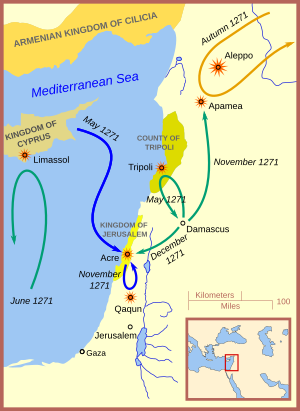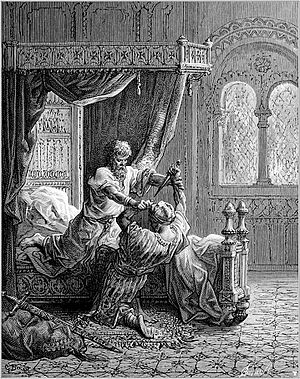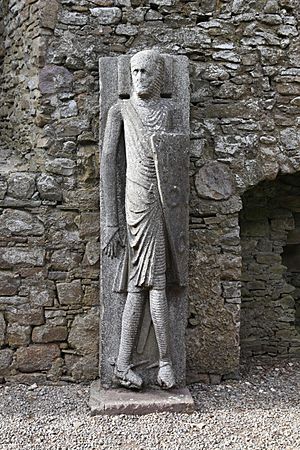Lord Edward's crusade facts for kids
Quick facts for kids Lord Edward's crusade |
|||||||
|---|---|---|---|---|---|---|---|
| Part of the Crusades | |||||||
 Operations during Lord Edward's crusade Mamluks Crusaders Mongols |
|||||||
|
|||||||
| Belligerents | |||||||
Military orders
|
|
||||||
| Commanders and leaders | |||||||
| Baibars | |||||||
| Strength | |||||||
|
Crusaders: Unknown
|
Unknown | ||||||
| Casualties and losses | |||||||
| Unknown |
Unknown total
|
||||||
Lord Edward's crusade, also known as the Ninth Crusade, was a military journey to the Holy Land. It took place from 1271 to 1272. This crusade was led by Edward, who would later become King Edward I of England. It was a continuation of the Eighth Crusade. This was the last major crusade to reach the Holy Land before the fall of Acre in 1291. After Acre fell, the Christian presence in the region ended.
During this crusade, Edward fought against the Mamluk leader, Sultan Baibars. Both sides had some small victories. However, the Crusaders eventually had to leave. Edward had important matters to deal with back home in England. He also felt he could not fix the problems within the remaining Crusader territories. Many historians believe the spirit of the Crusades was almost gone by this time. This crusade also showed that the last Crusader strongholds along the coast would soon fall.
Contents
Edward's Journey to the Holy Land
After the Mamluks defeated the Mongols in 1260, their leader Qutuz was killed. This allowed his general, Baibars, to become the new Sultan. Baibars then began attacking Christian Crusader cities. These included Arsuf, Haifa, Jaffa, and Caesarea. As these cities fell, the Christians asked Europe for help. But help was slow to arrive.
In 1268, Baibars captured Antioch. This destroyed a major Crusader area and threatened the small County of Tripoli. Edward decided to join the Crusades on June 24, 1268. Louis IX of France had already planned a large crusade to attack Egypt. However, he changed his mind and went to Tunis instead. Louis died there in 1270. He had given Edward money for his own crusade.
Edward and his brother Edmund prepared to join Louis. But their departure was delayed because their father, King Henry III of England, was unsure if he should go. He decided to stay in England. So, Edward's crusaders left Dover on August 20, 1270.
Edward traveled slowly through France. He reached Aigues-Mortes in late September. This was the same port Louis had used. Edward then went to Sardinia, waiting a month before sailing to Tunis. He arrived on November 10, too late for any fighting. A peace treaty had already been signed on October 30. Edward was not part of this treaty. He also did not receive any money paid to the other crusaders for leaving.
On May 9, 1271, Edward finally arrived at Acre. He had a small but important group of about 1,000 men. This included 225 knights. He came to help Bohemund VI, the Prince of Antioch and Count of Tripoli. They needed help against the Mamluk threat to the remaining Kingdom of Jerusalem.
Battles and Raids in the Holy Land
When Edward arrived, Acre was under attack. His arrival made Baibars change his plans and move away from Acre. Edward also found out that merchants from Venice and Genoa were trading with the Mamluks. They sold them wood and metal for weapons. They also traded slaves. Edward could not stop this trade because the merchants had official licenses.
Crusader Attacks
Edward's forces were too small to fight the Mamluks directly. They could not even stop the Mamluks from taking the nearby Teutonic Montfort Castle. So, Edward decided to launch a series of smaller attacks. He captured Nazareth and raided St Georges-de-Lebeyne. These raids mostly involved burning houses and crops. Edward also lost some men due to the heat.
Later, more soldiers arrived from England and Cyprus. These forces were led by Edward's younger brother, Edmund. This made Edward feel stronger. He launched a larger raid with the help of the Templar, Hospitaller, and Teutonic Knights. They attacked the town of Qaqun. The Crusaders surprised a large group of Turcomans. They reportedly killed 1,500 of them and took 5,000 animals. Edward did not capture the castle itself. He left before Baibars could respond.
In December 1271, Edward's troops helped defend Acre from a Mamluk attack. Baibars eventually stopped his siege of Tripoli. The exact reason is not known. Some say Edward's attacks forced him to leave. Others believe Baibars left because he did not know how strong the Crusaders really were.
Mongol Support
As soon as Edward reached Acre, he tried to form an alliance with the Mongols. He sent messengers to Abagha, the Mongol ruler of Persia. Abagha was an enemy of the Mamluks. On September 4, 1271, Abagha agreed to help. He asked when they should attack the Mamluks together.
In late October 1271, a Mongol army arrived in Syria. Abagha was busy with other conflicts. So, he could only send 10,000 horsemen under General Samagar. This force was made up of soldiers from Anatolia and some local troops. Even though it was a small force, their arrival caused many Muslim people to flee. They remembered earlier Mongol attacks. The Mongols defeated Turcoman troops near Aleppo. They raided south, causing other garrisons to flee. But the Mongols did not stay long. When Baibars launched a counter-attack on November 12, the Mongols had already left. They went back beyond the Euphrates River with their loot.

Baibars thought there might be a combined land and sea attack on Egypt. To prevent this, he built a fleet of ships. Instead of attacking the Crusader army directly, Baibars tried to land on Cyprus in 1271. He hoped to draw Hugh III of Cyprus and his fleet out of Acre. His goal was to conquer Cyprus and leave Edward's army isolated. Baibars disguised 17 warships as Christian vessels and attacked Limassol. However, his fleet was destroyed off the coast of Limassol. Baibars' armies were forced to retreat.
The Crusade Ends
After this victory, Edward realized he needed to stop the fighting among the Christian states. This was necessary to create a strong force to retake Jerusalem. He helped make peace between Hugh and his knights from the Ibelin family of Cyprus. At the same time, Edward and Hugh began talking about a truce with Baibars. They reached an agreement in May 1272 at Caesarea. It was a truce for 10 years, 10 months, and 10 days.
Soon after, Edmund left for England. Edward stayed to make sure the treaty would last. The next month, someone tried to assassinate Edward. The assassin's origin is unclear. Some say he was sent by an emir or by Baibars. Other stories claim the assassin was sent by the Hashshashin leader. Edward killed the assassin but was wounded by a poisoned dagger. This delayed his departure even more.
In September 1272, Edward left Acre for Sicily. While recovering there, he received sad news. First, his son John had died. A few months later, he learned his father, Henry III of England, had also died. In 1273, Edward began his journey home. He traveled through Italy, Gascony, and Paris. Edward finally reached England in mid-1274. He was crowned King of England on August 19, 1274.
What Happened Next

Theobald Visconti, who had been with Edward, became Pope Gregory X in 1271. Pope Gregory called for a new crusade in 1274. But nothing came of it. Meanwhile, new problems arose among the Christian states. Charles of Anjou took advantage of a disagreement between Hugh III, the Knights Templar, and the Venetians. Charles wanted to control the remaining Christian state. He bought claims to the Kingdom of Jerusalem. He then attacked Hugh III, causing a civil war within the kingdom. In 1277, Roger of San Severino captured Acre for Charles.
The fighting among the Crusaders was very damaging. It ruined any hope of a united crusade under Charles. This hope was completely lost when Venice suggested a crusade not against the Mamluks, but against Constantinople. Michael VIII had recently re-established the Byzantine Empire there. Pope Gregory would not have supported such an attack. But in 1281, Pope Martin IV agreed to it. This plan failed and led to the Sicilian Vespers in 1282. Charles was forced to return home. This was the last crusade against the Byzantines or the Muslims in the Holy Land.
Over the next nine years, the Mamluks made more demands. They asked for tribute and increased their persecution of pilgrims. This went against the truce. In 1289, Sultan Qalawun gathered a large army. He attacked the remaining parts of the county of Tripoli. He besieged its capital and took it after a bloody fight. The attack on Tripoli was very costly for the Mamluks. The Christian resistance was fierce. Qalawun lost his eldest son in the campaign. He waited two more years to rebuild his strength.
In 1275, Abaqa sent a message to Edward. Abaqa asked Edward to prepare for another Crusade. He said he could offer more help this time. Edward wrote back, thanking Abaqa for his help in the Ninth Crusade. He also mentioned his love for Christianity. Edward said he did not know when another Crusade would happen. But he was eager to return to the Holy Land. He promised to tell Abaqa if the Pope declared a new crusade. This letter was likely just a formality. Edward did not prepare for another crusade.
In 1291, a group of pilgrims from Acre were attacked. In return, they killed nineteen Muslim merchants. Qalawun demanded a huge payment as compensation. When no reply came, the Sultan used it as an excuse to besiege Acre. His goal was to finish off the last independent Crusader state in the Holy Land. Qalawun died during the siege. His son Khalil became the new Mamluk Sultan. With Acre captured, the Crusader States, except for Cyprus, no longer existed. The Crusaders' power moved north to Tortosa and then to Cyprus.
In 1299, a Mongol army led by Ghazan Khan raided the Mamluks. They had success in areas northeast of Homs and as far south as Gaza. But Ghazan eventually left Syria in 1300. The Mongols and the Armenian Kingdom of Cilicia tried another campaign to retake Syria. But the Mamluks defeated them in 1303. The last remaining Crusader foothold on the Holy Land, Ruad Island, was lost by 1303. The period of the Crusades to the Holy Land was over. This was 208 years after the First Crusade began.
See also
- Alexandrian Crusade
- Henry V, Count of Luxembourg, joined Edward of England on his crusade
 | Victor J. Glover |
 | Yvonne Cagle |
 | Jeanette Epps |
 | Bernard A. Harris Jr. |

